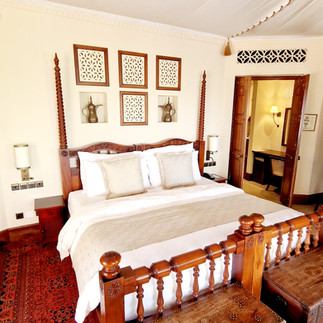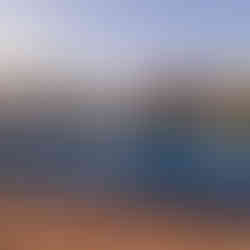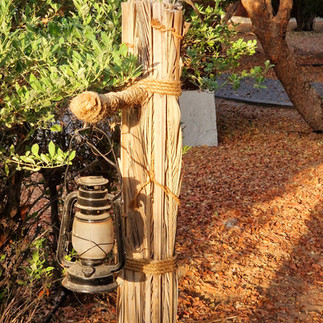Silence
- Bernd
- Sep 1, 2025
- 10 min read
Updated: Sep 3, 2025
Nowhere does man exert himself more
than in the pursuit of relaxation.
Laurence Sterne, Anglo-Irish writer, *November 24, 1713 - +March 18, 1768
2025

In the desert of the United Arab Emirates
I arrive in Dubai at the beginning of June. The heat wave at this time of year is reaching new heights. Everything gleams with (flagrant) luxury, one superlative tops the next. Almost dull. The promises of the competing market criers are limitless.

This time I am looking for the true luxury of our time, the priceless one that cannot be bought with money, Bitcoins or gold: silence.
Now, Dubai isn't necessarily the first place one associates with silence. It's more like parties, noise, and fuss. More show than substance, ignorance, and surveillance.
In the 2025 Freedom in the World Index, the UAE received only 18 out of 100 possible points. The US is likely performing significantly worse by now. But that's not my topic. Or is it?
The driver drops me off in the desert about an hour southeast of the metropolis. He leaves the E66 and turns onto a small road that soon becomes a gravel track.
The heat is relentless here, in the nothingness of sand and stone. Even the scattered trees and bushes don't help.

I get out. The oppressive air weighs heavily on my mind. The fine yellow desert sand makes every step torture. It gives way, letting you sink into it, it's so soft. It's like powdered sand. Have you ever tried to climb a dune of desert sand? Then you know how murderously soft sand is.

The epic tales of Lawrence of Arabia come to mind. Or those intrepid adventurers who dared an expedition ages ago.
With local guides, protective tents, tough pack animals, and sufficient provisions, they traveled relatively privileged. But the heat persists.
The clothes stick to your skin like wet rags.
Now, I don't intend to wage a war of liberation like Lawrence of Arabia, nor do I want to map unexplored territories. Other people have done that job long before me.
All I really want is silence. At best, I want to realign my inner map. I can't use the noise of the city for that.
What better place than the desert?
This wish had already matured a year earlier, during my one-day trip to the rocky desert of Saudi Arabia. Saudi Arabia and endless deserts, that's a good fit. But Dubai, the Emirates? That's the challenge.

Sandy desert, stone desert, ice desert. Let's stay with the sandy desert. What does reducing environmental stimuli to just a few do to me?
No mega-loud, constant music, no annoying cell phone noises, no street noise, no garbage, no loudmouths, no light pollution, no last-minute offers, no advertising and slogans, no antisocial people, neither rich nor poor, no ideological pollution.

Should I pitch my tent here and unload food and water for four days? I wouldn't survive 24 hours.
There are supposed to be poisonous snakes and scorpions. It's going to be very lonely.
Wilfred Thesiger, the UAE's first tourist
The British explorer and travel writer Wilfred Thesiger traveled to the Arabian Peninsula in 1948. He visited, among others, the present-day emirates of Abu Dhabi, Al Ain, Sharjah, and Dubai. The rigors of the desert were far greater in his time. Without the help of locals who knew the area, one ran the risk of literally drying out in the scorching desert.
After months of traveling through the desert, he reached Abu Dhabi on March 14, 1948. He enjoyed the hospitality of the then ruler Sheikh Shakhbut bin Sultan Al Nahyan and his brothers.

Thesiger then traveled to Al Ain and stayed at the Al Muwaiji Fort. His host was Governor Sheikh Zayed bin Sultan Al Nahyan, the later founder of the United Arab Emirates. Both shared a passion for falconry, and a friendship developed.
Thesiger admired the Sheikh's leadership, humility, and connection to Bedouin life.
Wilfred Thesiger documented the time before the great transformation in this region with his travels. He documented his experiences in his book Arabian Sands (1959), which is considered a classic of travel literature.
He was fascinated by the way of life of the Bedouins and his reports provided valuable insights into their way of life, their social order and their culture.
Falconry
Falcons are a national symbol and status symbol in the UAE. These birds of prey hunt birds and other animals for food. The art of falconry (hunting with a bird of prey) has a long tradition dating back some 4,000 years. It was not only a hunting method but also a sign of wealth.

Well, the days when falcons helped procure food are over. The Emiratis' passion for falconry remains undiminished to this day. A falcon can easily cost more than $200,000.
The falconer is a trusted person for the falcon, who feeds and protects it. Falcons are conditioned by systematic food deprivation, which is why they repeatedly return to the falconer.
The Sheikh Zayed Falcon Release Program was launched in 1995 and has since released more than 2,000 falcons into the wild.
In 1999, a falcon hospital opened in Abu Dhabi. It treats approximately 11,000 falcons annually. The hospital has since been expanded to include a training, education, and research unit. The hospital is open to the public. Information is available at: https://www.falconhospital.com/
By the way: The falcons wear a hood during transport to avoid stress and to calm themselves down.

Time in the moment
"Those who live with the Bedouins
must accept their conventions and adapt to their norms.
Only those who have traveled with them can appreciate the burdens of such a life.
What good is money in the sand to him?
I longed for the past,
detested the present
and feared the future."
Wilfred Thesiger

The vast majority of people don't have the slightest chance to think about traveling. This was true in the past and remains true today. Travel was and is a privilege. It required solid contacts or money. Ideally, both.

Mass tourism is a minefield. I'll spare you any thoughts about our all-inclusive mentality at this point: "The food was great. The staff was friendly!" That's it. It's not my thing.
I enjoy the moment and often get in my own way.
Solo travelers often encounter a lack of understanding. They either assign you the worst table, somewhere in the room, or shower you with attention, like Rosa did when she brought me a tray. I look at her questioningly. She smiles and nods toward the tray. "Maybe you want to read the newspaper, sir!"
The idea of enjoying the moment without digital distractions and simply observing the life around you—the people, their behavior, and the environment—can be incredibly enriching. Cheers to the expectation-free moment without distractions!

Silence is not simply the absence of noise. It reveals itself to me in doing nothing, when thoughts flow, come and go (and are allowed to), the gaze wanders into the distance, in the here and now, amidst this magnificent landscape of a seemingly lifeless, monotonous desert.

The desert has an effect on me. It's hard to imagine that people can live here. And yet they do. Constantly pushing themselves to the limit. This emptiness gives me freedom and inner peace. What was it like with the Bedouins? You are part of a community and nothing, lost, without them. Conversely, thousands upon thousands of people wandering through soulless streets empty the mind, numbing the senses. Life becomes greasy and sluggish, ponderous at best.

The desert constantly changes shape due to wind and heat. Sand and stones merge on the shimmering horizon, interrupted only by sparse vegetation, only to change their bizarre appearance once again in the evening glow. Colors fade. Transformation. A mysterious darkness covers the land. Only the starry night sky provides its meager light. Now I've arrived. And I ask myself the following superfluous question:
Where does the UAE's wealth come from?
Oil. That misses the point. If it were just oil, some African and South American countries would be swimming in money. But in reality, the populations in Venezuela, Libya, Nigeria... are desperately poor. So oil alone is no guarantee of prosperity.

Wilfred Thesiger describes Sheikh Zayed bin Sultan Al Nahyan, the founder of the UAE, as a strong-willed man who loved his people, the harshness of the Bedouin way of life and their traditions.
Simply put, he didn't use the unexpected wealth from oil exports to his own advantage. He had clear visions of a better future for his people that extended far beyond the era of oil.
This was only possible through education, infrastructure, and alternative sources of income – the development of the economy.
And clear social rules.
Your rights are my duties and vice versa

"Give me a little light that will free me and my family from the darkness."
That, or something similar, is how the army of workers who built this country and keep it alive put it. The UAE, in any case, has no problems recruiting skilled workers for its services. Quite the opposite. I've already described this sufficiently in my previous blogs.
Germany is narcotizing its development potential with horrendous social benefits, fueled by an inefficient judiciary that is crippling its work by convicting fare dodgers.
The UAE still has room for improvement when it comes to fundamental human rights and the protection of minorities. I assume that they must and will resolve these issues themselves. Just as we in Germany must and will resolve our deadlock.
As a traveler, it's wise to refrain from giving lectures in the country you're visiting. I don't always manage to do that, shame on me. I'll go one step further: What's perfectly possible here in Germany, such as the right to freedom of expression, is counterproductive or even dangerous elsewhere. Should we stop traveling because of that? Our world would suddenly become very small.

However, I do not deny my convictions either. When I'm asked about torture and the death penalty, I take a stand.

Even in North Korea, one could politely comment on this, but you should refrain from doing so, not even along the lines of: "The all-wise and god-like ruler will find ways of peace and harmony for the future and radiance of his beloved homeland, which will grant his subjects human dignity."
Maybe I should have applied for the diplomatic service.
Too late.
Bedouins, who knows their secrets?

Bedouins live as semi-nomadic tribes in the Arabian Desert, even today. They are known for their hospitality.
The majority now live in cities; only a few have retained their traditional way of life. They are excellent desert experts, survivalists, and gifted trackers.
Today, they live on the Arabian Peninsula, the Syrian Desert, parts of the Sahara, and the Negev.
Their preferred means of transport is the camel, also called a dromedary. It has only one hump. It still plays an important role in modern society, for example, in camel racing. Camel races take place in the cooler months from October to April.
The Bactrian camel has two humps. Both Bactrian camels and camels are ideally suited to life in the desert. They're like ships of the desert, in fact. And that's exactly how you feel on her rocking back. It's unthinkable if it goes through me.

Reforestation in the UAE
Anyone flying into Dubai during the day will notice the enormous efforts this city has made to green up in recent years. When I first arrived here almost 20 years ago, trees, green spaces, and parks were few and far between. People have to laboriously wrest every square meter of green space from the desert.

According to forecasts by the Stockholm Environment Institute, rising sea levels will consume 6% of land along the coastline. As a result, heat waves, sandstorms, and heavy rainfall will increase.

Following a reforestation initiative founded in 2010, one million trees were to be planted in a large tree nursery.
Everything went smoothly for six years. Then the project fell victim to a mega-construction project: more than half of the trees dried out. A mega-mall was supposed to be built on the site. In the end, the project was never realized. Embarrassing.
In 2024, Dubai Municipality announced the planting of 216,000 trees. The goal is to increase carbon sequestration and the city's resilience to the negative impacts of climate change.
Various projects have been launched for this purpose:

Planting 100 million mangrove trees along the coast, which are expected to absorb 1.2 million tons of CO2 annually.
Planting a 64 km green corridor along the highway.
Expanding renewable energy through solar and wind farms. The Muhammad bin Rashid Al Maktoum Solar Park will reach a capacity of 5,000 MW by 2030 and save 6.5 million tons of CO2 annually.
Waste management.
Expanding public transport and
electric vehicles.
Energy-efficient construction.
Bis 2030 will Dubai seine CO2-Emissionen um 50 % reduzieren, 2050 soll die vollständige Klimaneutralität erreicht sein.
Al Maha Desert Resort, Dubai *****
My rating: *****+

The houses, built on a hilltop, are shaped like Bedouin tents. They are nestled among mature trees, bushes, and shrubs that were planted here about 25 years ago. Antelopes roam the grounds, and the Qryx antilope appears. A vibrant array of diverse birds has made their home here.
The rooms are very spacious and furnished to a high standard. The service is first-class, with the staff very friendly and attentive. As a daily token of appreciation, they place a carafe of sherry, dates, Arabic pastries, and nuts on the table.

Impressions
The room also has a small easel with pastels, just in case the muse strikes. The Bedouin houses maintain a generous distance from the neighbors, thus preserving privacy.

The main building houses the restaurant, which serves breakfast, lunch, and dinner. Four o'clock tea, or coffee and pastries, is served in the library. Right next door is the bar, with a terrace overlooking the desert.
The spa, with its large pool, is located separately.
It is quite possible that a Oryxantilope uses the private pool as a drinking trough.
The resort offers its guests a variety of early morning activities, including desert tours, falconry demonstrations, walks through the surrounding area, archery, camel rides, and more. The guides are professional and friendly.
The atmosphere in the restaurant in the evenings, and especially on the terrace, is very relaxed. The staff stays discreetly in the background but is still very attentive.
Torches illuminate the area, and calm, unobtrusive music plays in the background, almost like something out of the movie Gladiator I.
All photos were taken inside and in the immediate vicinity of the hotel. As always, the information is provided without guarantee. I work independently and discreetly, and, with the exception of my apartments, I do not receive any financial compensation for recommendations in my travel blog.
My duplex apartment at Jumeirah Lake Towers, Dubai
The property is managed by HiGuests. Information and bookings at:






















Comments